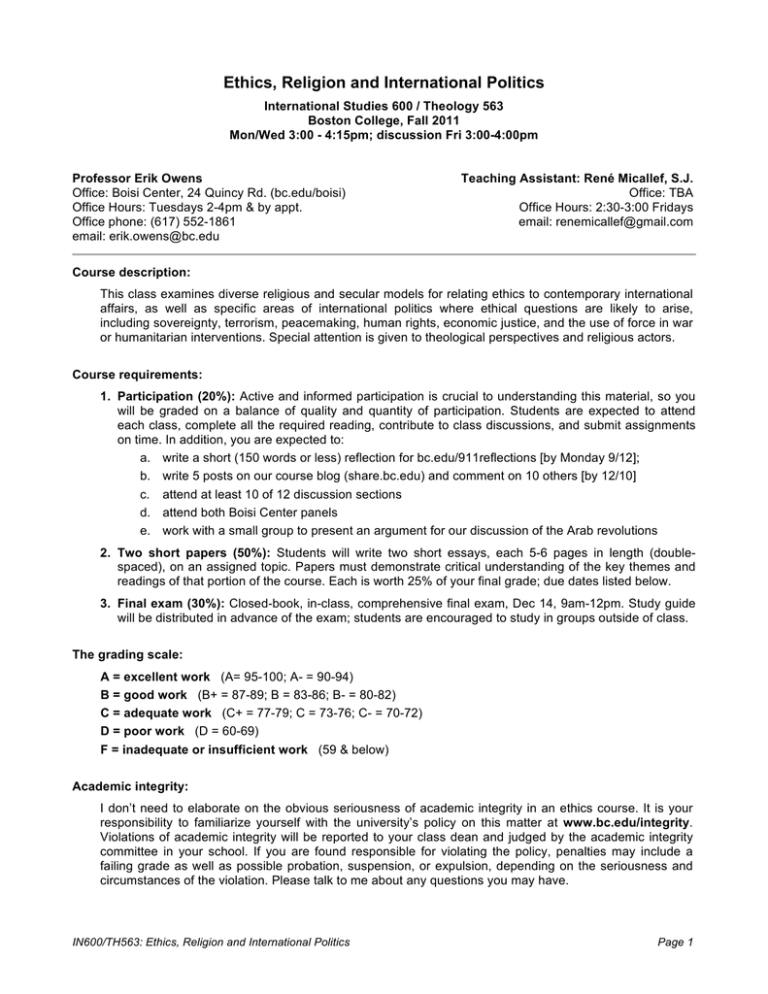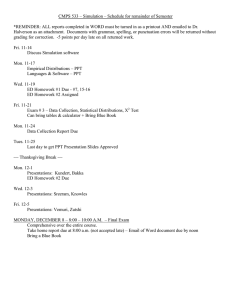Ethics, Religion and International Politics
advertisement

Ethics, Religion and International Politics International Studies 600 / Theology 563 Boston College, Fall 2011 Mon/Wed 3:00 - 4:15pm; discussion Fri 3:00-4:00pm Professor Erik Owens Office: Boisi Center, 24 Quincy Rd. (bc.edu/boisi) Office Hours: Tuesdays 2-4pm & by appt. Office phone: (617) 552-1861 email: erik.owens@bc.edu Teaching Assistant: René Micallef, S.J. Office: TBA Office Hours: 2:30-3:00 Fridays email: renemicallef@gmail.com Course description: This class examines diverse religious and secular models for relating ethics to contemporary international affairs, as well as specific areas of international politics where ethical questions are likely to arise, including sovereignty, terrorism, peacemaking, human rights, economic justice, and the use of force in war or humanitarian interventions. Special attention is given to theological perspectives and religious actors. Course requirements: 1. Participation (20%): Active and informed participation is crucial to understanding this material, so you will be graded on a balance of quality and quantity of participation. Students are expected to attend each class, complete all the required reading, contribute to class discussions, and submit assignments on time. In addition, you are expected to: a. write a short (150 words or less) reflection for bc.edu/911reflections [by Monday 9/12]; b. write 5 posts on our course blog (share.bc.edu) and comment on 10 others [by 12/10] c. attend at least 10 of 12 discussion sections d. attend both Boisi Center panels e. work with a small group to present an argument for our discussion of the Arab revolutions 2. Two short papers (50%): Students will write two short essays, each 5-6 pages in length (doublespaced), on an assigned topic. Papers must demonstrate critical understanding of the key themes and readings of that portion of the course. Each is worth 25% of your final grade; due dates listed below. 3. Final exam (30%): Closed-book, in-class, comprehensive final exam, Dec 14, 9am-12pm. Study guide will be distributed in advance of the exam; students are encouraged to study in groups outside of class. The grading scale: A = excellent work (A= 95-100; A- = 90-94) B = good work (B+ = 87-89; B = 83-86; B- = 80-82) C = adequate work (C+ = 77-79; C = 73-76; C- = 70-72) D = poor work (D = 60-69) F = inadequate or insufficient work (59 & below) Academic integrity: I don’t need to elaborate on the obvious seriousness of academic integrity in an ethics course. It is your responsibility to familiarize yourself with the university’s policy on this matter at www.bc.edu/integrity. Violations of academic integrity will be reported to your class dean and judged by the academic integrity committee in your school. If you are found responsible for violating the policy, penalties may include a failing grade as well as possible probation, suspension, or expulsion, depending on the seriousness and circumstances of the violation. Please talk to me about any questions you may have. IN600/TH563: Ethics, Religion and International Politics Page 1 Course Readings: Most of the course readings will posted online at our BC Share site for you to print, read and bring to class. In addition, the following texts may be purchased at the BC bookstore or online: Required books: • Kwame Anthony Appiah, Cosmopolitanism: Ethics in a World of Strangers (Norton, 2007) • John Carlson and Erik Owens, eds., The Sacred and the Sovereign: Religion and International Politics (Georgetown, 2003) • E.J. Dionne, Jean Bethke Elshtain and Kayla Drogosz, Liberty and Power: A Dialogue on Religion and U.S. Foreign Policy in an Unjust World (Brookings, 2004) • Michael Gross, Moral Dilemmas of Modern War: Torture, Assassination, and Blackmail in an Age of Asymmetric Conflict (Cambridge, 2009) • Martha Nussbaum and Joshua Cohen, For Love of Country? (Beacon, 2002) • Monica Duffy Toft, Daniel Philpott and Timothy Samuel Shah, God's Century: Resurgent Religion and Global Politics (Norton, 2011) • Michael Walzer, Just and Unjust Wars [4e] (Basic Books, 2006) Suggested readings about many topics are provided for those who want to dig deeper into the issues. You will not be responsible for this material on papers or your exam, though it will help you in class discussions as well as in your exams and papers. Recommended books: • Glenn Carle, The Interrogator: An Education (Nation, 2010) • John Esposito, What Everyone Needs to Know About Islam (Oxford, 2002) • Gareth Evans, The Responsibility to Protect (Brookings, 2009) • Eliza Griswold, Tenth Parallel: Dispatches from the Fault Line Between Christianity & Islam (FSG, 2010) • Sohail Hashmi and Jack Miles, Islamic Political Ethics (Princeton, 2002) Suggested news sources to consult regularly: • Council on Foreign Relations: Religion & Foreign Policy Initiative (www.cfr.org/ religioninitiative) The U.S. foreign policy Establishment. Their weekly email newsletters are highly recommended. • Pew Forum on Religion and Public Life (www.pewforum.org) Influential source for nonpartisan info, analysis and polls; their email newsletters are excellent. • The Immanent Frame (http://www.ssrc.org/blogs/immanent_frame) Long-form blog posts on secularism, religion and the public sphere. • Weekly newsmagazines: Economist, Atlantic, New Yorker, Time, Newsweek • International affairs sections of major media sites: Newspapers: WaPo, NYT, WSJ, Boston Globe, CSM; foreign papers if you read the language Radio: BBC, NPR Television: American networks, CNN, BBC, perhaps Al Jazeera English • Aggregators: Atlantic Wire “Five Best Columns” newsletter (http://www.theatlanticwire.com/); Slate’s The Slatest daily news (slatest.slate.com) • Updated news on Arab revolutions: BBC News Arab Uprisings page (http://bbc.in/rnCDAa) The Guardian interactive graphic: “The Path of Protest” (http://bit.ly/rmZ9Fw) NY Times “Arab World Uprisings” (http://nyti.ms/qPs89H): [updates ended July 17] • Muslim-West Facts Initiative (www.muslimwestfacts.com) Gallup World Poll of opinion leaders in the West and the Muslim world IN600/TH563: Ethics, Religion and International Politics Page 2 SYLLABUS: Getting Started (1) Wed 9/7 Ethics, religion and international politics What’s going on here? (2) Mon 9/12 Torture and interrogation [Guest speaker: CIA interrogator Glenn Carle] Is torture ever justified? Panel discussion: Interrogation Policy after Osama bin Laden Glenn Carle (CIA), Sanford Levinson (UTexas), Kenneth Himes, O.F.M. (BC) Higgins 310, 6:30-8:00pm, Mon 9/12/11 Part One: Religion and the Political Order (3) Wed 9/14 Religion and international relations theory Why was 9/11 a surprise to so many people? Fri 9/16 Discussion Section (4) Mon 9/19 Secularization and secularism in international relations Is the world around us “secular”? (5) Wed 9/21 Sovereignty: past, present, future Who’s in charge here? What happens when no one is? Political Evil: What It is and How to Combat It Alan Wolfe (BC), Martha Minow (Harvard Law School), James Traub (New York Times) Higgins 300, 6:00-7:30pm, Wed 9/21/11 Fri 9/23 Discussion Section (6) Mon 9/26 Sovereignty: God and Country Is Islam compatible with democracy? Is Christianity? (7) Wed 9/28 State/religion in comparative perspective What’s the difference between religious freedom and “separation of church & state”? Fri 9/30 Discussion Section (8) Mon 10/3 A clash of (and within) civilizations? Do Turkey and Sudan prove Huntington’s point? Does Europe prove him wrong? Part Two: Global Ethics and the Ethics of Globalization (9) Wed 10/5 Cosmopolitanism and patriotism Are political boundaries morally relevant? Who is our neighbor? Fri 10/7 Discussion Section; PAPER #1 DUE [Mon 10/10] [Columbus Day break] (10) Wed 10/12 Immigration and national identity What does immigration policy say about a nation’s values? Fri 10/14 Discussion Section (11) Mon 10/17 Religion, ethics and U.S. foreign policy Is there an Obama Doctrine on political and religious freedom? IN600/TH563: Ethics, Religion and International Politics Page 3 (12) Wed 10/19 Economic justice and development aid What makes the good life possible? What if foreign aid makes it worse? Fri 10/21 Discussion Section (13) Mon 10/24 international law & local justice Whose justice should prevail? (14) Wed 10/26 Human rights: the history of an idea Were human rights “invented”? Fri 10/28 Discussion Section (15) Mon 10/31 Human rights and God Are human rights religious and/or universal? Part Three: Peace, Violence and the Use of Force (16) Wed 11/2 Religious traditions of nonviolence What kind of person is nonviolent in the face of injury and injustice? Fri 11/4 Discussion Section (17) Mon 11/7 Christian Realism Why is Reinhold Niebuhr so popular in the Obama era? (18) Wed 11/9 Introducing the just war tradition Is war a moral act? When is it legitimate to attack? Fri 11/11 Discussion Section (19) Mon 11/14 Jus in bello Must war be hell? (20) Wed 11/16 Assassination and targeted killing Are targeted killings legitimate acts of war? Are drones acceptable weapons? Fri 11/18 Discussion Section; PAPER #2 DUE (21) Mon 11/21 Jus ad vim: sanctions, blockades, and sieges What coercive options exist short of war? [Nov 23-25] [Thanksgiving break] (22) Mon 11/28 Terrorism What are religious terrorists thinking? Can violence ever be “religious”? (23) Wed 11/30 Jus post bellum and religious peacebuilding How can religion be/come a source of reconciliation? Fri 12/2 Discussion Section Mon 12/5 (24) Revolutions in the Arab world [Class presentations] What’s at stake in the Arab revolutions? Wed 12/7 (25) Conclusion So, what? Fri 12/9 Discussion Section Wed 12/14 FINAL EXAM 9:00am (the first exam slot) IN600/TH563: Ethics, Religion and International Politics Page 4






